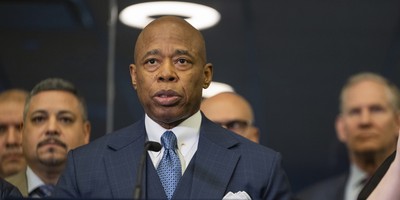People don’t have much faith in government, especially the federal government…and who can blame them? The public looks to Washington and sees neither competence nor integrity in the people and institutions who are determining their fate.
Into the vacuum have stepped the evangelists for a new god: the free market. In his new book, Let Them In:The Case for Open Borders, Wall Street Journal editorial board member, Jason Riley, argues that immigration policy ought to be set not by legislators and bureaucrats in Washington, but by the demands of the free market.
Americans have been raised to believe that free market capitalism has been the source of our abundance – and there is certainly much truth in that belief, especially when you compare it to the economic disasters created by centralized command economies. But any virtue taken to an extreme ultimately becomes destructive.
The free market, unregulated, unbridled, and divorced from any notion of public interest, is nothing more than the law of the jungle. At its best, American capitalism has never been a truly free market. Rather, the system has produced the greatest and most equitable prosperity when it has operated with the minimum regulation necessary to prevent it from devolving into an exercise in survival of the fittest.
An immigration policy dictated solely by market forces, as Riley and the Wall Street Journal advocate, is a surrender of our right as free people to choose our own destiny. Rather than determining our own future through our elected representatives (no matter how poorly they represent us), Let Them In: The Case for Open Borders suggests that we cede that prerogative to some amorphous entity known as the free market.
Recommended
Under the Riley/Wall Street Journal plan, the free market will decide when we’ve had enough immigration. Citing the example of the cessation of large-scale migration from Puerto Rico in the early 1960s, when average wages in the territory reached a mere 35 percent of what they were in the U.S., Riley predicts that today’s flow, principally from Mexico, will abate once a magic “tipping point” is achieved.
Riley is probably right, but that should be of little comfort to anyone who works for a living in this country. The end of Puerto Rican migration occurred because wages on the island rose to a level that convinced most people to stay put. Given the forces of globalism, the tipping point for Mexican workers is more likely to result from a decline in wages in this country, rather than substantially greater prosperity in Mexico.
But even when that magic tipping point is realized vis-à-vis Mexico, there will still be dozens of countries where workers still feel it benefits them to work at even a depressed American wage. Thus, the free market model Riley proposes would see mass migration end only when we’ve reached an economic tipping point with every country on earth, or when America becomes so overpopulated that it ceases to be an attractive alternative to people around the world.
One of the inherent flaws of the unbridled free market is that it is incapable of taking a long-term view of things. The unbridled free market said it was expedient to offer subprime mortgages to people who couldn’t afford the houses they were buying. It said it was more expedient to remain dependent on foreign oil than to develop alternative energy sources and invest on conservation.
Market forces ought to be a factor, not the only factor in determining immigration, or any other policy. Immigration policies must be formulated with a sense of how they will affect us in the long-term, economically, socially and culturally. Moreover, they must be formulated by the American people and those who are accountable to us. The free market has no accountability and no responsibility to serve the greater good.
This nation’s founders were dedicated to the revolutionary principle of self determination. They believed that a free people ought to be in charge their own destiny – a free people, not a free market. Policies that are forced upon us, whether by monarchs, dictators, or plutocrats amounts to tyranny. Let Them In: The Case for Open Borders is, in reality, the case for the tyranny of the marketplace that few Americans would be willing to accept.
























Join the conversation as a VIP Member